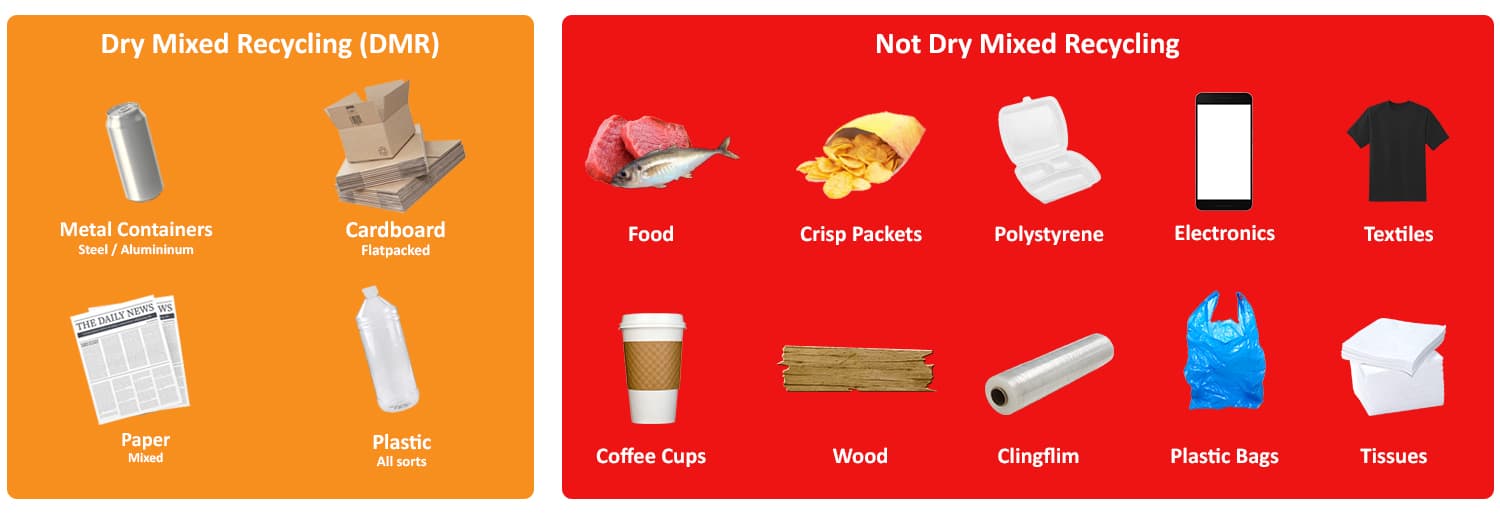Contact us today for your Free Quote
What Is Dry Mixed Recycling?
Dry Mixed Recycling (DMR) is our most popular way of disposing of clean and uncontaminated recyclable materials. We must significantly increase DMR segregation, to reach the UK target of recycling 70% of general waste by 2030, and promote the circular economy.
DMR consists of recycling materials that include paper, cardboard, metal cans and plastic, which can then be put into one waste stream and be processed efficiently & effectively.
As the name suggests, the waste must be dry to be processed. If your waste is wet, it should be either dried or be disposed of correctly in the general waste stream to prevent contamination.
Food remnants in your DMR and certain types of materials such as coffee cups and crisp packets can also cause contamination. Please educate yourself on what can be thrown in DMR bins using the infographic below.

The Process
Once your DMR waste is collected by our Euro 6 fleet vehicles, the waste is then tipped into our materials recovery facility (MRF), which is powered by 4,000 solar panels – making it London’s most sustainable recycling facility.
Upon arrival, every load of DMR waste is inspected for contamination by our employees. If the waste has a high level of contamination, the waste is then quarantined and documented, and the client will be informed on how the material will be treated.
Once the inspection is cleared, our state-of-the-art equipment segregates each material. Firstly ‘The grab’ picks up the bulk material and removes any stray material before the waste goes any further.
A large quantity of recyclable material we receive is placed in bags, to release the DMR from the bags the DMR is processed through two large rotating bag splitters.
After the DMR is released from the bags, the waste is then sorted at the presort cabin by human hands, where any residual waste is removed alongside any other debris that might prevent the efficient sorting of the dry recyclables. Plastic film is also removed at this stage and is collected in a dedicated bunker.
Subsequently, your DMR is then screened based on their shape, size and chemical makeup. These screens begin to separate and group items together using a set of steel rotating discs, also known as the OCC.
Firstly cardboard, large boxes and cartons are filtered using the OOC while the smaller material falls through the OOC separating the material automatically.
On the other screen, flat materials such as paper, magazines and newspapers are filtered out. The flat materials then go through the handpicking cabin for quality control to remove any non-recyclable material that sneaks through. Once sorted the materials travel via conveyer belt to the bailing machine awaiting its next process.
3D materials which mainly consist of plastic and metal drinks containers are conveyed to a triple-level near-infrared optical sorting system which separates the materials based on their chemical makeup. After this process, an over band magnet extracts ferrous metals and simultaneously an eddy current repels aluminium, separating the materials into different silos.
Once all materials are bailed, your DMR is ready to be sent to reprocessors, to re-enter the production cycle.
The Benefits of DMR
Dry mixed recycling has enormous benefits to our environment; it reduces the amount of waste sent to landfills and incinerators, massively reducing carbon emissions. This process also helps us conserve natural resources such as timber, water and minerals whilst protecting natural habitats, saving energy and money within product life cycles.
DMR Facts
- Recycling aluminium drink cans saves up to 95% of the energy needed to make aluminium from its raw materials.
- Every day around 8 million pieces of plastic makes their way into our oceans.
- 12.5 million tonnes of paper and cardboard are used annually in the UK.
- Lambeth council in London pointed out “it is 6 times cheaper to dispose of recycled waste than general refuse.


